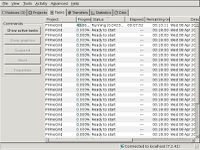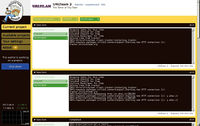We are still actively working on the spam issue.
Citizen Science
In the context of modern computing, Citizen Science is the pooling of computer resources in order to divide the workload required to perform scientific calculations and research, in whole or in part, by amateur or nonprofessional computer enthusiasts. In 2020, it became commonplace once again due to the Folding@Home project announcing it would be participating in finding a cure for the Coronavirus Pandemic.
Contents
BOINC
The Berkeley Open Infrastructure for Networked Computing is a framework for combining multiple computers together to perform work. A central server divides up the work into small tasks and passes it out to clients in it's network, which then compute the work and send back the results. What kind of work?
- SETI@Home - Find alien signals.
- DistrRTgen - Generate rainbow tables to crack Windows passwords.
- PrimeGrid - Find and factorize prime numbers for encryption.
- LHC@Home - Assist the Large Hadron Collider.
- Einstein@Home - Find neutron stars.
- Rosetta@Home - Fold proteins for disease research.
- GPUGrid - Fold proteins for more disease research.
- ClimatePrediction - Model climate change.
- Collatz Conjecture - Solve mathematical problems.
- World Community Grid - Assist AIDS and cancer research.
BOINC is cross-platform, but each project has it's own platform requirements. Most have at least a Windows and Linux client.
Your GPU can be used instead of your CPU to compute results faster. Some projects support an Nvidia OpenCL client and a few support AMD GPUs.
Once installed and attached to projects, BOINC takes care of itself. It will pause computation if it detects significant cpu/gpu usage so you shouldn't notice any slowdown when you're doing something intensive.
Depending on the project, tasks can take anywhere from a few minutes, to many days. When you complete tasks you are awarded points. You can track these points on several different websites. You can also join teams and share your points with them.
Hentai@Home
E-Hentai Galleries (the guys that give us sadpanda) run a service called Hentai@Home that allows users to distribute the load of hentai porn in their database over P2P, thus reducing the load on their main servers. In return, you get rewards on E-Hentai.
The Hentai@Home client runs on any platform that supports Java 6, and supports a graphical or command-line interface.
E-Hentai pays out rewards in Hath points, which can be exchanged for Credits or Gallery Points, all of which unlock features or allow you to download full-size archives of individual galleries. The H@H algorithm is weighted to reward clients for connection quality or "Trust" instead of total data volume. Static IPs are a plus, as the service correlates Trust with the amount of static IP ranges associated with your client. You must be able to sustain at least 3.00Mb/s or 375 KB/s upload speeds.
Legality
Since E-Hentai hosts all manner of lolicon, shotacon and bestiality content, running a Hentai@Home node may violate local laws depending on your jurisdiction. As of writing, there is no way to prevent your Hentai@Home client from caching and serving this content. In addition, cached files are served over unencrypted HTTP and are stored in an unencrypted format. Proceed with caution.
Do NOT run a Hentai@Home node if you live in the a jurisdiction where lolicon, shotacon, and bestiality content is illegal, such as the United Kingdom.
Folding@Home
From their website: Folding@home (FAH or F@h) is a distributed computing project for simulating protein dynamics, including the process of protein folding and the movements of proteins implicated in a variety of diseases. It brings together citizen scientists who volunteer to run simulations of protein dynamics on their personal computers. Insights from this data are helping scientists to better understand biology, and providing new opportunities for developing therapeutics.
Folding@Home generated a significant uptick in popularity and computing power by the normieverse due to the Coronavirus Outbreak of 2020 to develop the synthetic spike protien genome in the Coronavirus Gene Therapy Treatment by Pfizer and Moderna.
Folding@Home has (at date of writing) three packages for x64 GNU/Linux (Debian), but only one for x86 (again, Debian). Other GNU/Linux system prebuilt packages exist, however these three packages are the fahclient, fahcontrol, and fahviewer. While the client itself requires no major dependencies, the controller and client require Gnome Libs, and by extension D-Bus.
GalaxyZoo
Galaxy Zoo is an interactive project where, after a brief tutorial and test, you help identify galaxies and other objects in space through your browser.
Archive Team
The Archive Team Warrior Virtual Machine downloads web pages to assist Archive Team in keeping a copy of websites which are being taken down.
Distributed.net
Distributed.net is a distributed system of computers on a internet-enabled network working together to solve problems. Distributed.net utylizes the combined CPU and GPU power in an attempt to crack encryption systems and solve complex mathematical equations. The reason for the cracking is not some kind of NSA honeypot. The reason for the cracking of encryption systems is to make them better. In the mid 1990's, an encryption standard known as DSA was the world standard (this was before PGP). In combination with Distributed.net, and the EFF, they were able to crack this encryption standard, showing the fallacies in it. Soon after, the encryption standard was replaced with a much better one.
Distributed.net currently has two current projects running, and three possible future projects.
GIMPS
GIMPS (Great Internet Mersenne Prime Search) is an effort to use distributed computing to find the next largest prime number using custom software. The current largest prime number M(82 589 933) was found this way.


